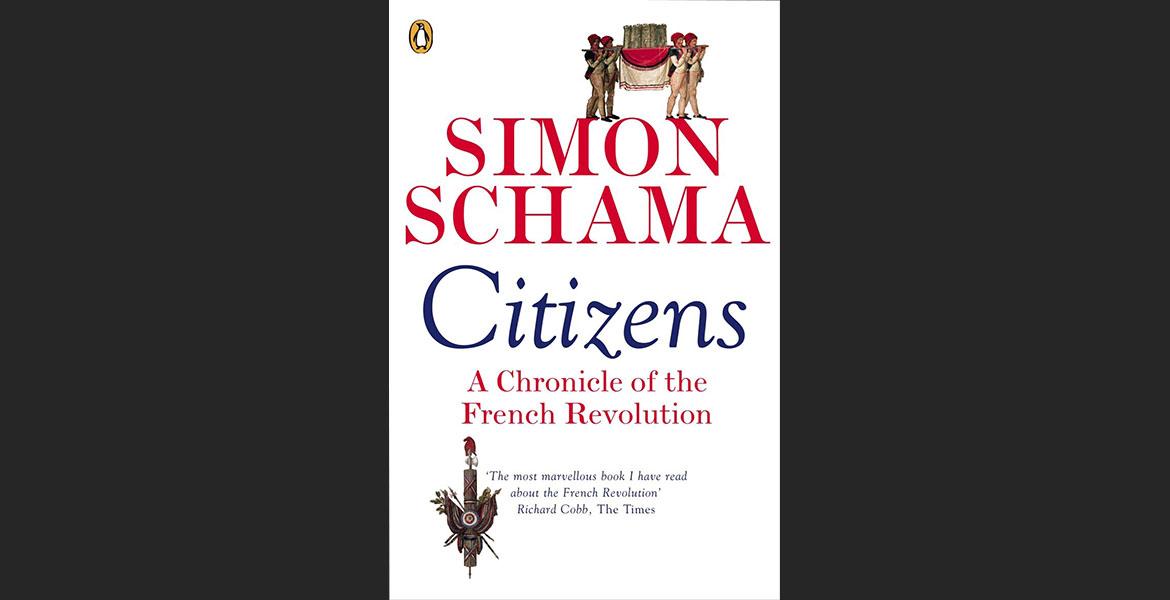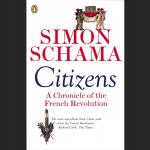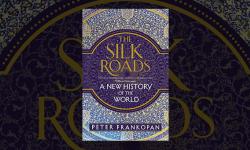Citizens: A Chronicle of the French Revolution, Simon Schama
1989, the bicentennialThe two-hundredth anniversary. of the fall of the BastilleA fortress in Paris, once used as a state prison, which was torn down during the French Revolution. and the ‘official’ start of the French Revolution, saw an enormous body of literature flood the market. Intending a celebration of the Rights of ManThe Declaration of the Rights of Man and of the Citizen was a document drawn up during the French Revolution that listed the human and civil rights of all men; also a book by Thomas Paine written in 1791 that argued that revolution was permissible in certain situations., President Mitterrand perhaps expected most works to be favourable, congratulating the revolutionaries for contributing to the progress of humanity. Instead, many publications emphasised the bloodthirsty nature of the Revolution, criticising the Terror, attacks on the Vendée rebelsPeople participating in the counter-revolutionary movement in and around the Vendée region of France during the French Revolution. and federalistsIn general, those who support the system of government in which several states form a unity but remain independent in internal affairs. Specific to the French Revolution, they were a group of people who objected to the centralisation of the French Revolution after 1793., the ‘armed missionaries’ Said by Robespierre, ironically enough, in 1792. Quoted in Schama, Simon, Citizens: A Chronicle of the French Revolution, London: Penguin (1989) p. 505.marching across the continent, and the man held responsible for it all, Robespierre.
Said by Robespierre, ironically enough, in 1792. Quoted in Schama, Simon, Citizens: A Chronicle of the French Revolution, London: Penguin (1989) p. 505.marching across the continent, and the man held responsible for it all, Robespierre. Doyle, William, The French Revolution: A Very Short Introduction Oxford: OUP (2001) p. 17, 105.
Doyle, William, The French Revolution: A Very Short Introduction Oxford: OUP (2001) p. 17, 105.
Simon Schama’s Citizens: A Chronicle of the French Revolution (London: Penguin, 1989) is undoubtedly the best of these. Taking the narrativeA story; in the writing of history it usually describes an approach that favours story over analysis. approach, he appeals both to the mass market and the specialist. Schama’s beautifully descriptive prose follows the causes and course of the French Revolution from the 1770s to the fall of Robespierre. Through his detailed 740-page work he draws from disciplines across the historical spectrum, including art history and women’s studies, cultural history and the history of science, as well as the expected political and economic strands. The thrust of his argument is simple: the Revolution did not constitute a step forward; it delayed progress and consumed everything – including liberty – in its path. Harsh criticism of the Revolution is balanced by a forgiving line on the French monarchyThe king/queen and royal family of a country, or a form of government with a king/queen at the head.. Thus, his discussion on Louis XVI’s expensive and exclusive coronationThe ceremony of crowning a king or queen (and their consort). is more slapdash than Colin Jones’ carefully reasoned approach, scapegoatingTo blame a person for the wrongdoings, mistakes, or faults of others. the clergyThe people ordained for religious duties, especially in the Christian Church. for bad decisions rather than assessing the deep divide in Louis’ character. Schama, Citizens, pp. 40-1; Jones, Colin, The Great Nation: France from Louis XV to Napoleon, London: Penguin (2002) pp. 300-1.
Schama, Citizens, pp. 40-1; Jones, Colin, The Great Nation: France from Louis XV to Napoleon, London: Penguin (2002) pp. 300-1.
Schama’s style is deliberately provocativeDeliberately causing anger or other strong feelings., his introduction defensive. Narrative, Schama claims, is necessary to understand this ‘haphazard and chaotic event’, Schama, Citizens, p. xvii. despite the risks of being ‘mischievously old-fashioned.’
Schama, Citizens, p. xvii. despite the risks of being ‘mischievously old-fashioned.’ Ibid., p. xviii. The text is littered with such polemicalDescription of writing or speech in which a person strongly attacks or defends a particular view or argument. statements as ‘historians have been accustomed to tracing the sources of France’s financial predicament to the structure of its institutions…nothing of the sort was true’,
Ibid., p. xviii. The text is littered with such polemicalDescription of writing or speech in which a person strongly attacks or defends a particular view or argument. statements as ‘historians have been accustomed to tracing the sources of France’s financial predicament to the structure of its institutions…nothing of the sort was true’, Ibid., p. 49. while references to ‘historians never tire of…’ and ‘historians at this point…’, distance him from the profession, adding further to his idea of personal rebellion.
Ibid., p. 49. while references to ‘historians never tire of…’ and ‘historians at this point…’, distance him from the profession, adding further to his idea of personal rebellion. Ibid., p. 338 and p. 553. Yet there is something tongue-in-cheek about these statements: his is a challenge to the established historiographyThe study of writing history, or of history that has already been written. of the Revolution, intended more to provoke debate than to silence it. And although there is undoubtedly something mischievous about his writing, his reasoning is sound. A thematic approach gives unintentional weight to one aspect over another, and an understanding of the key players, written almost biographically, is necessary to see that events were shaped by those men – and women – who acted in them.
Ibid., p. 338 and p. 553. Yet there is something tongue-in-cheek about these statements: his is a challenge to the established historiographyThe study of writing history, or of history that has already been written. of the Revolution, intended more to provoke debate than to silence it. And although there is undoubtedly something mischievous about his writing, his reasoning is sound. A thematic approach gives unintentional weight to one aspect over another, and an understanding of the key players, written almost biographically, is necessary to see that events were shaped by those men – and women – who acted in them.
ObjectivityThe lacking of bias or prejudice., Schama claims, is unobtainable, and so Citizens is subjectiveInfluenced by personal feelings, tastes, or opinions.; ‘an exercise in animated description’. Ibid., p. 6. This infinitely adds to its readability, although the emotional tug is taken beyond the requirements of non-fiction. Tears prick the eyes over the final separation of Louis from his family and the fate of young Louis-Charles. The sense of loss is palpable during the description of Malesherbes’ final moments awaiting his meeting with the National RazorSlang term for the guillotine during the French Revolution., watching the decapitationThe literal loss of one's head. of his daughter and his granddaughter. But did Schama really need to write of the ‘old man’s’ ‘likely reflection that by not heeding his younger daughter’s advice to emigrate he had somehow attracted the attention of the TribunalGenerally, a court of justice; during the French Revolution, the court that tried political offenders. and destroyed his family’,
Ibid., p. 6. This infinitely adds to its readability, although the emotional tug is taken beyond the requirements of non-fiction. Tears prick the eyes over the final separation of Louis from his family and the fate of young Louis-Charles. The sense of loss is palpable during the description of Malesherbes’ final moments awaiting his meeting with the National RazorSlang term for the guillotine during the French Revolution., watching the decapitationThe literal loss of one's head. of his daughter and his granddaughter. But did Schama really need to write of the ‘old man’s’ ‘likely reflection that by not heeding his younger daughter’s advice to emigrate he had somehow attracted the attention of the TribunalGenerally, a court of justice; during the French Revolution, the court that tried political offenders. and destroyed his family’, Ibid., p. 700.to add further pathosA quality that evokes pity or sadness.: is it not clumsy to salute the death of this bastion of reason with the RomanticCharacterised by expressions of love; or an idealised way of looking at something; or someone who followed the Romantic artistic movement, that focused on individualism and emotion. pull of emotion?
Ibid., p. 700.to add further pathosA quality that evokes pity or sadness.: is it not clumsy to salute the death of this bastion of reason with the RomanticCharacterised by expressions of love; or an idealised way of looking at something; or someone who followed the Romantic artistic movement, that focused on individualism and emotion. pull of emotion?
In keeping with the narrative form, the book has no endnotes (although sources and bibliography are provided by chapter at the end). For a work of popular history, this is understandable although now uncommon. However, fact-checking is not easy, and a cynic might wonder if this is a secondary reason. Despite this, he is well-read and familiar with the subject, proven by his analysis of both the written sources and the artefactsObjects made by humans that are of historical interest., and it is somewhat unfair to criticise Citizens for lacking in historical debate. Doyle, The French Revolution, p. 105. There is a firm grounding in secondary works, with the narrative style not fully ruling out academic discussion. Analysis is not overstated, but Schama knows the historiography, has his own, very decided, opinions on it, and feels he is making a valuable contribution.
Doyle, The French Revolution, p. 105. There is a firm grounding in secondary works, with the narrative style not fully ruling out academic discussion. Analysis is not overstated, but Schama knows the historiography, has his own, very decided, opinions on it, and feels he is making a valuable contribution.
In Schama’s desire to show happenstance he focuses on the individual decisions, which ‘More than any inequity in a society based on privilege, or the violent cycles of famine that visited France in the 1780s’, Schama, Citizens, p. 48. were the cause of the Revolution. However, it should be noted that the restrictions those privileges placed on the ‘actors’ affected their decisions, and limited options. The fiscalRelating to government revenue, especially taxes. crisis, for example, was difficult to resolve exactly because France’s institutions were archaicVery old or old-fashioned.. That is not to say the Revolution was predetermined since the reign of Louis XIV, but that something had to change. The ‘cast’ merely provided the way in which change occurred.
Schama, Citizens, p. 48. were the cause of the Revolution. However, it should be noted that the restrictions those privileges placed on the ‘actors’ affected their decisions, and limited options. The fiscalRelating to government revenue, especially taxes. crisis, for example, was difficult to resolve exactly because France’s institutions were archaicVery old or old-fashioned.. That is not to say the Revolution was predetermined since the reign of Louis XIV, but that something had to change. The ‘cast’ merely provided the way in which change occurred.
Despite this, Schama attempts to develop a number of themes, with varying success. The least well-developed is his consideration of the role of the family in cultural ideologyA system of ideas and ideals.. The clashing roles of women, from the ideal domesticated mother to the reality of thinking, independent women, are explored particularly in the relationship between Louis and Marie-Antionette. The queen’s Romantic inclinations, competing with the country’s expectations of her, led both to a decrease in her popularity and to questions over Louis’s ability to govern his family, let alone the state. However, this analysis, which starts so well, is quickly subsumedIncluded or absorbed into something else. by the thrill of violence.
The clash between liberty and the power of the state is better developed, particularly when ‘power’ includes not just military, but economic, survival: liberty is impossible when the state is threatened. This draws in Schama’s third theme, that of the Revolution in context, as part of eighteenth-century France rather than as separate from it. According to his view, the Revolution did not represent a sudden break from the past and the start of a new era. Instead, it was part of the continuing narrative of change within France. ‘French culture and society in the reign of Louis XVI,’ argues Schama, was ‘troubled more by its addiction to change than by resistance to it’. Ibid., p. xvii. Drawing on cultural as well as political evidence, Schama shows that sections of the nobilityThe highest hereditary stratum of the aristocracy, sitting immediately below the monarch in terms of blood and title; or the quality of being noble (virtuous, honourable, etc.) in character. embraced revolutionary ideas with glee. It was the representatives of the ancien régimeThe political and social system that existed in France before the revolution. – parlementairesMembers of the French parlements., noblesse d'épéeLiterally, 'nobles of the sword'. Noblemen of the oldest class of nobility in France dating from the Middle Ages and the Early Modern periods. (including a prince of the bloodSomeone descended in the male line from the monarch.) and the salon regulars – who provided the Revolution with its leaders. The ‘popular’ revolution of the sans-culottesLiterally, 'without trousers'. Typically, the radical and militant commoners of the French Revolution. and the provinces was, then, a reaction against ‘modernization, rather than…impatience with its speed of progress’.
Ibid., p. xvii. Drawing on cultural as well as political evidence, Schama shows that sections of the nobilityThe highest hereditary stratum of the aristocracy, sitting immediately below the monarch in terms of blood and title; or the quality of being noble (virtuous, honourable, etc.) in character. embraced revolutionary ideas with glee. It was the representatives of the ancien régimeThe political and social system that existed in France before the revolution. – parlementairesMembers of the French parlements., noblesse d'épéeLiterally, 'nobles of the sword'. Noblemen of the oldest class of nobility in France dating from the Middle Ages and the Early Modern periods. (including a prince of the bloodSomeone descended in the male line from the monarch.) and the salon regulars – who provided the Revolution with its leaders. The ‘popular’ revolution of the sans-culottesLiterally, 'without trousers'. Typically, the radical and militant commoners of the French Revolution. and the provinces was, then, a reaction against ‘modernization, rather than…impatience with its speed of progress’. Ibid. To Schama, the Maximum and other protectionistShielding an economy by protecting it from foreign imports and favouring local produce. laws show the traditional nature of the Revolution. That he was writing primarily for a capitalistSupporting an economic and political system in which a country's trade and industry are controlled by private owners for profit, rather than by the state., laissez-faireThe policy of leaving things to take their own course, without interfering. audience would, of course, have no impact on definitions of ‘traditional’ and ‘revolutionary’.
Ibid. To Schama, the Maximum and other protectionistShielding an economy by protecting it from foreign imports and favouring local produce. laws show the traditional nature of the Revolution. That he was writing primarily for a capitalistSupporting an economic and political system in which a country's trade and industry are controlled by private owners for profit, rather than by the state., laissez-faireThe policy of leaving things to take their own course, without interfering. audience would, of course, have no impact on definitions of ‘traditional’ and ‘revolutionary’.
Schama’s main preoccupation is with violence. Unlike previous generations of historians, particularly those supporting the ‘classic’ French view, he considers the Terror not as an aberration but as integral to the success of the Revolution. To Schama, the Revolution depended ‘on organized killing to accomplish political ends’ Ibid., p. 538. and a consideration of violence is therefore essential. The gory accounts of suffering, such as the ‘vertical deportations’ at Nantes, where stripped and bound rebels were placed by their hundreds in sinking boats,
Ibid., p. 538. and a consideration of violence is therefore essential. The gory accounts of suffering, such as the ‘vertical deportations’ at Nantes, where stripped and bound rebels were placed by their hundreds in sinking boats, Ibid., pp. 666-7. will appeal to fans of Crichton and Clancy. This sort of sensationalismThe presentation of stories in a way that is intended to provoke public interest or excitement, at the expense of accuracy. undoubtedly helps sell books – Citizens was a New York Times best-seller and is still in the top 10,000 on Amazon
Ibid., pp. 666-7. will appeal to fans of Crichton and Clancy. This sort of sensationalismThe presentation of stories in a way that is intended to provoke public interest or excitement, at the expense of accuracy. undoubtedly helps sell books – Citizens was a New York Times best-seller and is still in the top 10,000 on Amazon Amazon.co.uk, ‘Citizens: A Chronicle of the French Revolution’ accessed 25 September 2017. – but Schama resolutely insists that ‘it does historians no credit to look aside in the name of scholarly objectivity’.
Amazon.co.uk, ‘Citizens: A Chronicle of the French Revolution’ accessed 25 September 2017. – but Schama resolutely insists that ‘it does historians no credit to look aside in the name of scholarly objectivity’. Schama, Citizens, p. 667. To what extent Schama believes this is questionable: that he paraphrasesRewords something. the same justification at least five times smacks of a need to convince himself as well as the reader. His choice of dating the start of the Revolution to July 1789, and finishing with the fall of Robespierre five years before its end, according to his own dates,
Schama, Citizens, p. 667. To what extent Schama believes this is questionable: that he paraphrasesRewords something. the same justification at least five times smacks of a need to convince himself as well as the reader. His choice of dating the start of the Revolution to July 1789, and finishing with the fall of Robespierre five years before its end, according to his own dates, Ibid., p. 3. is suspicious. That Citizens doesn’t include the White TerrorA reactionary movement against the excesses of the initial French revolutions, especially of the Reign of Terror. – a glaring omission considering the number of pages dedicated to the JacobinOf, or relating to the Jacobin Club: a political group during the French Revolution, which became identified with extreme egalitarianism and violence and which led the Revolutionary government from mid-1793 until mid-1794. Terror – may be for expediency’s sake, but is likely determined by his obvious sympathy for the victims of 1789 to 1794. At the other end, if a start date of 1788 had been chosen, perhaps with the inability of the NotablesImportant or high-ranking people; also, prior to the French Revolution, the people called together to try to solve the country's problems. or the parlementsIn pre-Revolution France, provincial appeals courts. There were 13 in total, the most important being situated in Paris. to find a solution to the economic crisis, then political instability rather than violence would be key: as Schama says, ‘the Notables were the first revolutionaries’.
Ibid., p. 3. is suspicious. That Citizens doesn’t include the White TerrorA reactionary movement against the excesses of the initial French revolutions, especially of the Reign of Terror. – a glaring omission considering the number of pages dedicated to the JacobinOf, or relating to the Jacobin Club: a political group during the French Revolution, which became identified with extreme egalitarianism and violence and which led the Revolutionary government from mid-1793 until mid-1794. Terror – may be for expediency’s sake, but is likely determined by his obvious sympathy for the victims of 1789 to 1794. At the other end, if a start date of 1788 had been chosen, perhaps with the inability of the NotablesImportant or high-ranking people; also, prior to the French Revolution, the people called together to try to solve the country's problems. or the parlementsIn pre-Revolution France, provincial appeals courts. There were 13 in total, the most important being situated in Paris. to find a solution to the economic crisis, then political instability rather than violence would be key: as Schama says, ‘the Notables were the first revolutionaries’. Ibid., p. 203.
Ibid., p. 203.
There is a reason Citizens is popular. It redefined debate on the French Revolution, the role of violence within it, and the need to consider it holistically. It challenged prevailing notions of its causes, its effects – both short- and long-term – and how it was studied. What’s more, it did so during a time of celebration, with an obvious snub to traditional historians. In utilising the narrative format, Schama rose above the traditional history and the historians who presented it, while at the same time provoking response, thus keeping his argument in both the public and the academic eye. But it is the quality of his language, the fullness of description, and the well-argued plea to emotion that, whatever the professional failings of the book, make Citizens worth reading.
- Log in to post comments







